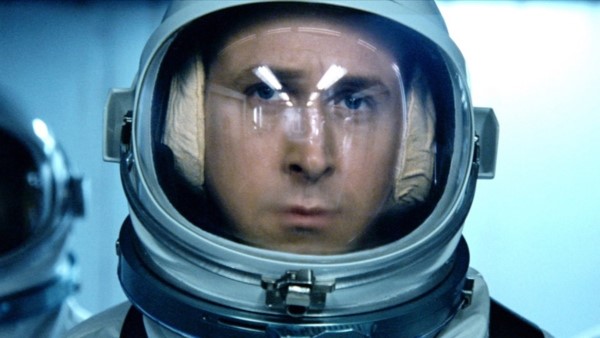First Man Review

Since the 1960s, America has glorified space travel, and for better or worse, Hollywood has been implicit this glamorization. In “First Man,” director Damien Chazelle ironically tries to bring the moon mission story down to earth, making a film about the bold, pensive and unassuming man who became an American hero, whose journey to the lunar surface was anything but glamorous.
As an auteur, Chazelle was never going to comply with Hollywood’s mold, so audiences looking for the space movie in which the crew completes the impossible task and everyone at mission control cheers as soaring music plays in the background would be better off popping “Apollo 13” back into their VHS player. He is much more concerned with the gritty details, as is screenwriter Josh Singer (“Spotlight”), and the real-life costs and implications – both on society and on Armstrong – of the Space Race.
“First Man” is filmed with the intention of being a visceral experience, so the largest and most high-quality audio/visual format is recommended. Chazelle prioritizes the sensory element of the film (in the action sequences) over the storytelling element. His concern is not whether we understand why Neil Armstrong (Ryan Gosling) needs to flip this or that switch and how exactly it all works, but that we can feel the insane duress of his role and situation. Therefore, the more immersive the viewing format, the better the experience. Design, visuals and sound come together in impressive fashion here, and the remarkable craftsmanship of the production team won’t translate as well in smaller formats. (Watching it on my 42” TV with only TV speakers, I found myself occasionally disengaging.)
The telling of Armstrong’s story, however, comes across loud and clear. The script focuses more on Armstrong and the Space Race behind closed doors, with only a few select moments of greater cultural context. The public attention on the NASA space program was tremendous, and Singer and Chazelle’s laser focus on the people behind it conveys the significant cost that came with succeeding.
The film introduces us to Neil and his wife, Janet (Claire Foy), as they are trying to figure out how to keep their terminally ill daughter alive, establishing Neil’s personal stakes and how he tried to manage family life and personal feelings in a high-pressure field that so often took the lives of his colleagues. Gosling gets to flex his internal acting muscles a lot more in this role, showing the way Armstrong kept his family at both a physical and emotional distance. Gosling plays him as stoic and brooding—extremely mild-mannered. It’s not a splashy role, but one that absolutely showcases his range.
Chazelle consequently takes the lead of his film’s main character and most of the film ends up even-keeled, downplaying moments of emotional volatility, except for some scenes involving the more expressive Janet. Neil was extremely mission-focused and matter-of-fact, so it makes sense that we should see the film’s events with the same perspective, not rose, white and blue-colored glasses. Chazelle even uses Gil Scott-Heron’s spoken-word poem “Whitey on the Moon” in one montage as a way of putting these astronauts’ heroism in perspective.
All in all, “First Man” is not a space film that will leave anyone cheering, but we have enough of those. We don’t have enough filmmakers making painstaking efforts to replicate the experiences of these astronauts in all their wonder and dread. We don’t have enough films that assess the human and emotional cost of the historical moments we’ve idealized and put on a pedestal. Getting a somber and maybe even lackluster space movie is a small price to pay for such impressive production.
4/5 Stars
First Man
Directed by Damien Chazelle
Written by Josh Singer, James R. Hansen (book)
Starring: Ryan Gosling, Claire Foy, Kyle Chandler




0 Comments
You can be the first one to leave a comment.